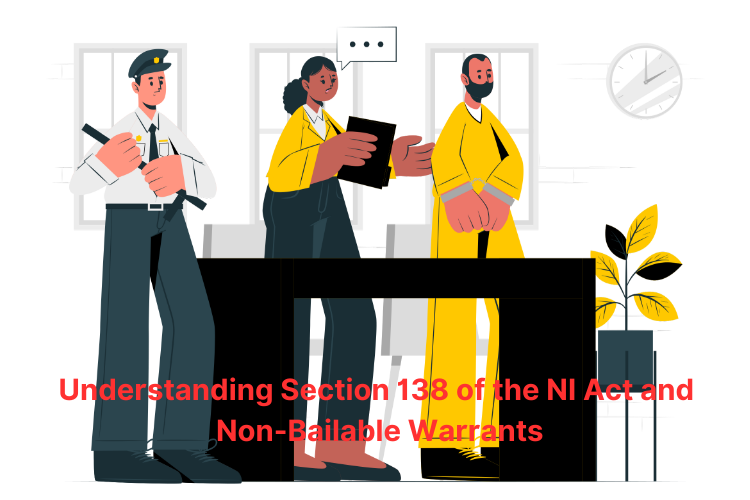The Negotiable Instruments Act (NI Act) empowers legal professionals with tools to tackle dishonored cheques. Section 138 stands tall as a crucial provision for recovering unpaid debts. However, navigating its intricacies and dealing with Non-Bailable Warrants (NBWs) requires a firm grasp of the legal landscape.
This blog post serves as a comprehensive resource for advocates and lawyers to enhance their understanding of Section 138 and NBWs. We’ll delve into the essential elements, explore real-life examples, and highlight how Handyy, a powerful law practice management software, can be your trusted companion in handling these cases effectively.
Key Elements of Section 138 NI Act
- Cheque Issuance: The cheque must be issued for settling a specific debt or liability.
- Dishonor of Cheque: Presentation to the bank should result in dishonorment due to insufficient funds.
- Demand Notice: A legal notice demanding payment within 15 days is crucial.
- Time Limit for Filing Complaint: A complaint must be filed within one month from the date of receiving the notice if the drawer fails to make the payment.
Actionable Tips for Advocates and Lawyers
Drafting Effective Notices
- Clarity is Key: Ensure that your notice clearly states the details of the cheque, including the date, amount, and reason for dishonor.
- Use Registered Post: Sending notices via registered post can provide proof of delivery, which is crucial in legal proceedings.
In K.K. Verma v. Union of India, the court emphasized that a clear and unambiguous notice is essential for maintaining a case under Section 138.
Timely Filing of Complaints
- Monitor Deadlines: Use practice management software like Handyy Law Practice Management to set reminders for filing complaints within stipulated timelines.
- Maintain Documentation: Keep all records related to transactions and communications to support your case.
In Saketh India Ltd. v. Indian Securities Ltd, failure to file a complaint within one month led to dismissal, highlighting the importance of adhering to timelines.
Understanding Non-Bailable Warrants (NBW)
In situations where the accused repeatedly fails to appear before the court despite multiple summonses, a Non-Bailable Warrant (NBW) can be issued. This empowers the police to apprehend the accused without bail.
Practical Steps for Handling NBWs
- Prompt Response: If a client receives an NBW, they should respond immediately by seeking legal counsel.
- Filing for Cancellation: An advocate can file an application for cancellation of NBW if there are valid grounds.
Crucial Considerations for NBWs
- Offense Severity: The court considers the gravity of the offence before issuing an NBW.
- Repeated Absence: Consistent non-appearance triggers the possibility of an NBW.
- Potential Repercussions: An NBW can lead to arrest and potential imprisonment if the accused doesn’t surrender.
Real-Life Case Study: Utilizing Section 138 Effectively
Imagine a client approaches you with a dishonored cheque for a significant sum. Here’s how Handyy can empower you to handle this case efficiently:
- Case Creation: Establish a new case within Handyy. Input crucial details like cheque amount, date of issuance, and dishonorment date.
- Document Management: Securely store the dishonored cheque and all supporting documents (e.g., legal notices, court orders) within the dedicated case file.
- Legal Research: Leverage Handyy’s comprehensive legal research database to access relevant case laws and legal provisions for effective case preparation.
- Time Tracking: Accurately record time spent on this case, ensuring precise billing and maximizing productivity.
- Client Communication: Seamlessly maintain communication with your client through integrated email, SMS, and other channels.
- NBW Management: Track the progress of NBW issuance (if applicable) and keep your client informed.
By employing Handyy’s robust features, you can manage Section 138 cases with remarkable efficiency. From meticulous case organization to streamlined communication, Handyy fosters a comprehensive case management approach.
Conclusion: Streamlining Section 138 Cases with Handyy
Section 138 of the NI Act equips legal professionals with a powerful tool to recover unpaid debts arising from dishonored cheques. Understanding the legal framework and utilizing effective case management techniques are crucial for success.
Handyy, your one-stop legal practice management software, empowers you to excel in handling Section 138 cases. Its comprehensive features and user-friendly interface enable you to:
- Manage cases efficiently
- Enhance legal research capabilities
- Facilitate seamless client communication
- Optimize time management for improved billing
Ready to transform your legal practice? Sign up for a free 30-day trial of Handyy today! Handyy Law Practice Management.

